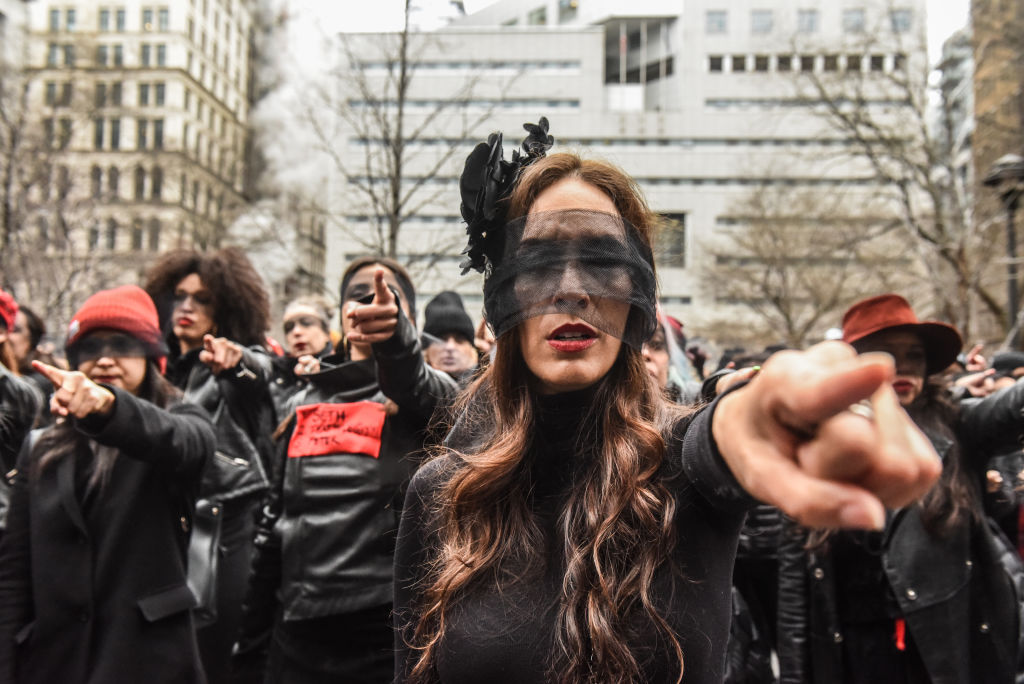When Tarana Burke started the original Me Too movement in 2006, it was about the victims. It was about power in numbers and emboldening survivors of sexual assault to come out of the shadows. When the allegations about Harvey Weinstein broke in 2017 and #MeToo really started gaining traction, I was happy to see the purging of predators across all industries and political parties. #MeToo was a bipartisan movement that was long overdue.
After a few questionable high-profile accusations, such as the hit piece against the comedian Aziz Ansari on the now-defunct website babe.net, lots of voices started to ask if #MeToo had gone too far. As someone who has never confronted the man who assaulted me and who knows hundreds of other women (and men) with the same experience, part of me wondered if it could ever truly go far enough.
Another part of me didn’t like the direction it was heading. The movement veered into the same territory as the Title IX kangaroo courts. A crowdsourced Google spreadsheet titled ‘Shitty Media Men’ cost people jobs and their reputations. #MeToo was being used to bring people down in the court of public opinion with evidence-free allegations and rumors. A weaponized #MeToo would undermine any man who sought to run for office. Anyone paying attention could see it was only a matter of time before the Democrats would risk sacrificing #MeToo on a risky political power move.
It didn’t take long. During the 2018 Kavanaugh hearings, the movement morphed from #MeToo into #BelieveAllWomen. Almost overnight, sexual assault became a partisan issue. It was no longer about the victims — it was now a political binary. You were either righteous in your contempt for sexual assault or displayed your virtue by demonstrating your devotion to due process. It became about winning rather than justice. Sexual assault survivors stood to lose the most. I was livid. Instead of empowering victims, #MeToo was corrupted.
The day after Christine Blasey Ford testified against Supreme Court nominee Brett Kavanaugh, a full-page ad ran in the New York Times that demanded ‘Believe Women’. I loathed the phrase. It felt infantilizing and disempowering. The original intent of feminism was equality, not receiving special privileges because I have a vagina. #MeToo was about justice for victims, but denying the accused due process isn’t justice, it’s tyranny. I wanted to be given the benefit of the doubt, not treated with kid gloves. I wanted to be given the space to be heard, not put on a pedestal of infallibility.
When the #BelieveAllWomen chickens came home to roost for Biden, the idea lost all credibility — and that’s a good thing. #BelieveAllWomen was never sustainable, at least not as long as we value the presumption of innocence — because in order to ‘believe all women’ you have to start with the presumption of guilt. It was an impossible and unsustainable standard. The Democrats sacrificed #MeToo for #BelieveAllWomen and they lost. Still, it was sure catchy and convenient — until, that is, the rules applied to them.
You can’t claim to believe all women while also claiming #IBelieveBiden, whether or not his accuser, Tara Reade, is telling the truth. Well you can, but you’re either lying to yourself or lying to us or voicing the quiet part out loud, which is why you now have people openly saying, ‘I’m willing to support Biden even if he’s guilty. I don’t care if I set back the movement.’ What kind of message does this send to women? That you’re only believable if you’re useful, and if you’re no longer useful, like a political slogan, you’ll be discarded?
***
Get three months of The Spectator for just $9.99 — plus a Spectator Parker pen
***
Two sets of standards emerged: the one we hold our opponents to and the one that we hold ourselves and our teammates to, and when you paint the opponent as evil, there is nothing you won’t forgive in your candidate, or team, or yourself. When everything is an existential crisis, no sacrifice is too great. If this is your one chance to take ‘literally Hitler’ out of office, it’s OK that your guy may be a little bit rapey. It’s the same way the ‘party of family values’ justified a philandering Trump to themselves. The ends justify the means and let’s just all ignore the cognitive dissonance. But I disagree with this philosophy. How we get to our goal is just as important as getting there. If we have to sacrifice our principles on the way, it’s not worth it.
Watching the Democratic party take the #MeToo movement, build it up into the untenable #BelieveAllWomen and toss it aside when it didn’t fit their narrative has been disheartening. I have conflicting feelings because on the one hand, I’m grateful to see the sudden (although politically convenient) focus on respecting due process. On the other hand, it’s difficult not to get cynical and feel that as survivors we were used. Our pain was extracted for power and now we are exactly where we started.
But it’s important that I remember not to throw the baby out with the bathwater. The essence of the movement remains strong. The 19-year-old me who was raped lived in a very different world to a 19-year-old who is sexually assaulted today. Much of that cultural progress is due to #MeToo. Just because politics took the movement and made it toxic, doesn’t mean we can’t take it back.


















